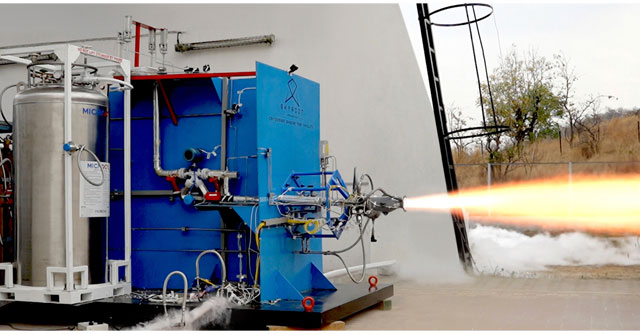
Skyroot Aerospace test-fires 3D-printed cryogenic engine for 2024 rocket


Private homegrown space startup, Skyroot Aerospace, on Tuesday announced a successful test-firing of its second fully 3D-printed cryogenic engine, Dhawan-II, for a 200-second duration. This is the second cryogenic rocket that has been successfully test-fired by Skyroot, following the Dhawan-I engine that was tested in November 2021. The engine will feature in a future rendition of the company’s 3D-printed, privately built rockets, the company confirmed in a press statement.
Naga Bharath Daka, chief operating officer and cofounder of Skyroot, said that the engine will enhance the payload capacity of the company’s Vikram lineup of rockets, which will be used to launch satellites into low-Earth orbits.
The new engine, Dhawan-II, is more powerful than its predecessor, offering 3.5 kilo-Newton (kN) of thrust — in comparison to the 1kN thrust that Dhawan-I can produce. While the latter is tipped to be used in Skyroot’s Vikram-I rocket that is scheduled to launch later this year, Dhawan-II will power the company’s second-generation rocket, Vikram-II, which will succeed the Vikram-I.

On March 6, Pawan Kumar Chandana, chief executive of Skyroot, told Mint that the company is looking to conduct multiple commercial launches with Vikram-I, following the commencement of its launch services later this year. “The development of Vikram-II will continue simultaneously,” the executive added.
Cryogenic engines are said to be better suited to power long-range and long-duration first stages of a rocket, which in turn can lead to increased range and trajectories of satellite launching rockets. This could be beneficial in giving rockets added versatility in terms of the range of distance that orbits that they can cover.
Skyroot said in a statement that its latest cryogenic engine, Dhawan-II, used two rocket propellants — liquid natural gas (LNG) and liquid oxygen (LOX) that are stored at temperatures of below -150 degrees Celsius. The used fuels are also environmentally friendlier when compared to solid semi-cryogenic rocket fuels, the company claimed.

Skyroot Aerospace is India’s most funded private space startup, having raised $51.5 million so far. The company also became the first private firm in space to launch a rocket from Indian soil, with its suborbital Vikram-S rocket on November 18. Fellow private space startup Agnikul Cosmos is also expected to join Skyroot in launching private rockets from domestic soil, with its own line of Agnibaan rockets.
